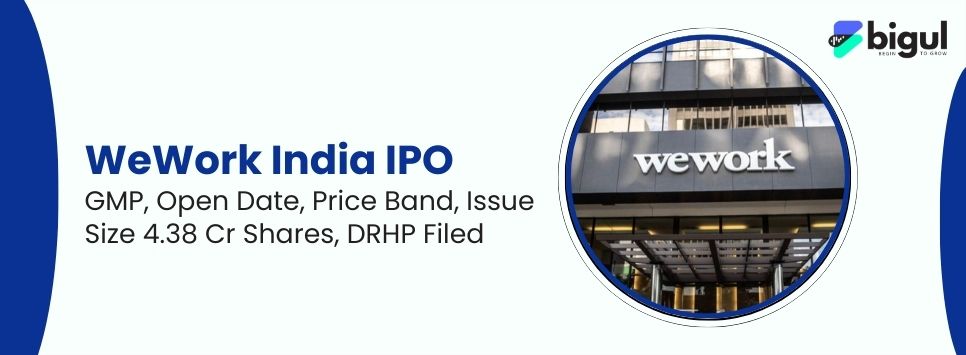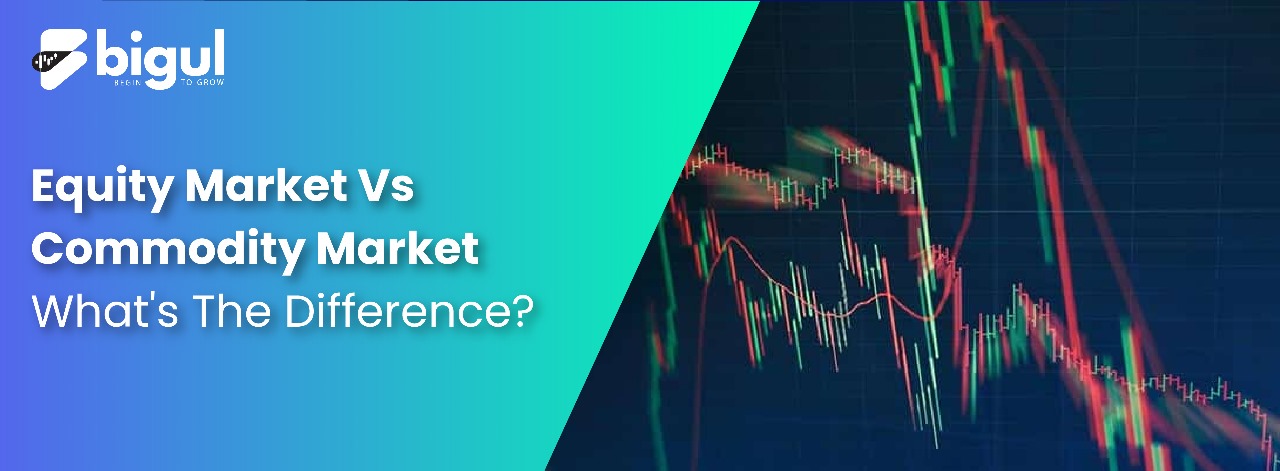The world of financial markets offers a diverse range of investment opportunities, with equity and commodity markets standing as two prominent pillars. Understanding these markets’ differences is essential for investors navigating the financial world.
Equity markets involve ownership in companies and the trading of stocks. Commodity markets deal with tangible goods like oil, metals, and agricultural products.
This article compares and contrasts these two market types, highlighting their unique characteristics, risks, and investment opportunities. It attempts to educate readers to make smart financial decisions.
What is the Equity Market?
An equity market is like a marketplace for buying and selling pieces of companies, called shares. In India, we often call it the stock market or share market. Here, people can trade these shares.
Globally, these shares are traded either in special places called stock exchanges or directly between people. Many buyers and sellers are always ready to make deals in the equity market.
If you want to start trading shares online in India, you’ll need something called a “demat account” and a “trading account”. It’s easy to open one, and it’s like a digital wallet for your shares.
Types of Equity Market
Equity markets come in various forms, each catering to different types of securities and investors. There are two primary types of equity markets:
- Primary Equity Market: The primary equity market is where companies issue new shares to raise capital through Initial Public Offerings (IPOs). In this market, investors purchase shares directly from the company, providing them with an opportunity to become initial shareholders. The funds raised through IPOs enable the company to finance its expansion, reduce debt, or undertake various strategic initiatives. This primary market serves as the initial point of entry for stocks into the broader secondary equity market.
- Secondary Equity Market: The Secondary Equity Market in India, synonymous with the stock market, is where investors engage in trading existing shares of publicly listed companies. Major stock exchanges in this sector are NSE and BSE. It facilitates share trading, raising market liquidity and stock values. The Indian Secondary Equity Market is a cornerstone of the nation’s financial infrastructure. It grants investors access to a broad spectrum of financial instruments, playing a pivotal role in raising capital for businesses.
Procedures Involved in the Equity Market
Participating in the equity market in India involves several key procedures. Whether you’re an individual investor or an institutional player, these steps are generally followed:
- Trading: Trading in the Indian equity market involves investors placing buy and sell orders through stockbrokers via online platforms or phone calls. Stock exchanges like NSE and BSE facilitate order matching based on price and time priority. This process results in price discovery and displays the best available bid and ask prices. Trading is the initial stage where market participants engage in the buying and selling of stocks, setting the foundation for subsequent settlement and clearing processes.
- Settlement and Clearing: After trade confirmation, equity market settlements in India operate on a T+2 basis, with delivery-based trades being settled within two business days. The NSE Clearing Limited for NSE and the Indian Clearing Corporation Limited (ICCL) for BSE function as clearinghouses.
- On the settlement date, shares are delivered to the buyer’s Demat account, and funds are transferred to the seller’s bank account, ensuring a smooth and secure transaction process.
- Risk Management: In the Indian equity market, risk management is crucial to maintain market stability. Traders often need to maintain Margin deposits to cover potential losses, acting as collateral. Circuit breakers are used to halt trading in case of extreme price swings, preventing panic selling or buying.
Additionally, the Volatility Control Mechanism adjusts trading parameters based on historical price movements to control excessive market volatility and ensure orderly trading conditions. These risk management tools are vital for maintaining market integrity and investor confidence.
Advantages of Equity Investments
Equity investments in India are popular with long-term wealth builders due to their many benefits. Equity investments in India have several benefits:
- High Growth Potential: India’s strong economic growth and development prospects present a promising environment for equity investors. The country has consistently demonstrated economic expansion, attracting both domestic and foreign investments. Equity investments in Indian companies offer the potential for substantial capital appreciation as businesses expand and profits increase. This makes it an attractive avenue for long-term wealth accumulation and the realisation of significant returns on investment.
- Dividends: In India, equity investments often provide dividends to shareholders. Dividends are periodic payouts made by companies to their investors, typically from their profits. These payments can serve as a source of passive income for investors. Regular dividends can enhance the total returns on investments, providing an additional financial benefit alongside any potential capital gains from the appreciation of stock or share values.
- Liquidity: Liquidity in equity investments signifies how readily an investor can trade their stocks or shares. In a liquid market, there’s a robust trading volume, ensuring minimal price impact when buying or selling. Liquidity is crucial as it allows investors to access their investment capital promptly and take advantage of market opportunities without hurdles.
- Diversification: Diversification is a major advantage of equity investments in India. It refers to the strategy of spreading one’s investment capital across a variety of sectors, industries, and companies. By doing so, investors minimise the risk associated with any single investment performing poorly. If a specific stock or sector experiences a downturn, the negative impact on the overall portfolio is reduced because other investments may continue to perform well. This risk mitigation strategy enhances the potential for more stable and consistent returns.
- Tax Benefits: Long-term capital gains from equity investments often enjoy tax exemptions. Equity shares and mutual fund units held for more than a year in India are usually exempt from capital gains tax. This tax incentive makes long-term equities investing appealing since investors may build wealth without paying high taxes. It encourages long-term equity investments to meet wealth-building and retirement planning goals while minimising taxes.
Disadvantages of Equity Investments
Equity investing has several pros and cons. Investors considering stock investing must be aware of these risks. Equity investing has several drawbacks:
- Market volatility: Market volatility is a major drawback of equity investments, as they are susceptible to rapid and unpredictable price fluctuations. This can result in the value of your investment rising or falling dramatically in a short period, making it challenging to predict returns and potentially leading to significant financial losses.
- Lack of Guaranteed Returns: Equity investments lack guaranteed returns, meaning there’s no assurance that an investor will make a profit or even recoup their initial investment. Unlike fixed-income assets such as bonds, which offer predefined interest payments, stocks’ returns are tied to the company’s performance. This makes them riskier for individuals seeking a stable and predictable income.
- Limited Control: Limited control in equity investments means that shareholders, especially those with minority stakes, have little say in a company’s management or decision-making. They cannot dictate corporate policies or strategies. This can potentially lead to a disconnect between their interests and those of the company’s management, which can impact the value and direction of their investments.
What is the Commodity Market?
India’s Commodity Market is represented primarily by the (Full form) MCX (Multi Exchange Commodity). It is a dynamic marketplace for trading a wide spectrum of commodities. In this market, diverse assets like energy resources, precious metals, agricultural products, and industrial metals find a platform for buying and selling. For businesses and investors, the Commodity Market serves as a risk management tool, helping them hedge against price volatility. It’s an essential facilitator of commerce, ensuring that the Indian economy can rely on consistent pricing and supply of crucial raw materials and resources.
Types of Commodities Traded in the Commodity Market
The Indian commodity market trades agricultural products, industrial metals, and energy resources. Here is the table outlining the main commodities traded in India’s commodity market:
| Commodity Category | Examples of Commodities |
| Agricultural | Rice, Wheat, Sugar, Cotton, Oilseeds, Spices, Pulses, etc. |
| Precious Metals | Gold, Silver, Platinum |
| Energy | Crude Oil, Natural Gas, Coal |
| Base Metals | Copper, Aluminum, Zinc, Nickel, Lead, etc. |
| Livestock | Live Cattle, Live Poultry, Hides |
| Soft Commodities | Coffee, Cocoa, Rubber, Cotton |
| Exotic Commodities | Guar Gum, Guar Seeds, Mentha Oil |
Commodity Derivatives as Instruments for Trading in Commodities
Commodity derivatives serve as instruments allowing stakeholders to offset potential losses arising from price fluctuations in commodities and mitigating risk through hedging strategies; these tools are designed to provide a safeguard against market volatility and uncertainty and are primarily employed by traders, producers, and consumers in various industries. In India, the NCDEX (National Commodity and Derivatives Exchange) is a prominent platform dedicated explicitly to trading agricultural commodities, offering futures and options contracts. Unlike long-term assets, these derivative instruments focus on short to medium-term positioning, aiming to manage risk rather than serve as enduring investments.
Advantages of Investing in Commodity Market
Investing in the commodity market in India can offer several advantages for investors and traders.
Some of its key benefits are:
Diversification: Investing in the commodity market in India offers diversification benefits as it tends to have a low correlation with traditional assets like stocks and bonds. This means that when stock markets fluctuate, commodities often move independently, which reduces the overall risk in an investment portfolio. So, investors can potentially safeguard against stock market volatility and achieve better risk management by adding commodities to their portfolios. This enhances the stability and resilience of their investments.
Inflation Hedge: The progressive rise in prices of goods and services in an economy is called inflation. As inflation occurs, the Indian Rupee buys fewer goods and services. In this context, commodities can serve as an effective hedge against inflation for several reasons:
- Intrinsic Value: Commodities have inherent value due to their utility in various industries and as basic necessities.
- Supply and Demand Dynamics: Inflation often drives up demand for commodities as currency values decline.
- Diversification:Commodities provide portfolio diversification, reducing the impact of inflation on overall returns.
- Safe-Haven Status: Precious metals like gold are sought after during periods of economic uncertainty and high inflation.
- Economic Conditions:Growing economies increase demand for commodities, aligning with periods of inflation.
Portfolio Risk Management: Commodity investments can mitigate risks in a portfolio by counterbalancing potential losses in sectors sensitive to commodity price fluctuations. For example, if you hold stocks in energy companies which are affected by oil prices, investing in oil commodities can act as a hedge. When energy stock values decrease due to falling oil prices, the gains in your oil commodity investments can offset these losses.
This risk management strategy helps maintain portfolio stability, making it less vulnerable to industry-specific or economic downturns. Hence, it offers a more balanced and resilient investment approach.
Speculative Opportunities: Commodity markets offer speculative opportunities where traders can capitalise on short-term price fluctuations. This involves buying low and selling high, potentially yielding quick profits. It attracts investors seeking high-risk, high-reward scenarios. Speculative trading strategies often involve leveraging market trends, technical analysis, and news events to make bets on commodity price movements. While this approach can be lucrative, it also carries a significant risk of loss. Therefore, individuals engaging in speculation should be well-informed and prepared to manage their risks effectively in the volatile commodity market.
Exposure to Global Markets: Investing in the commodity market in India provides exposure to global economic trends and geopolitical events. Many commodities are influenced by international factors, making them a window into the broader global landscape. For instance, oil prices are impacted by international supply agreements and geopolitical tensions. When investing in Indian commodities, you indirectly tap into these worldwide influences. This can potentially profit from hedging against international developments, which can be particularly valuable for investors seeking a diverse range of market influences in their portfolios.
Physical Asset Ownership: Commodities like gold and silver offer the advantage of physical asset ownership. This means investors directly possess tangible goods, making it a reliable store of value. In times of economic uncertainty or inflation, the intrinsic worth of these assets tends to hold, providing a safeguard against declining currency values. This feature can be reassuring to investors who value the security of owning a physical asset in their investment portfolio, especially when seeking protection against economic volatility or currency devaluation.
Disadvantages of Investing in Commodity Market
Investment in India’s commodity market helps diversify portfolios and hedge against inflation, but it also has drawbacks and risks. Here are some drawbacks of investing in Indian commodities:
- Volatility: Commodity prices can be highly volatile, leading to substantial investment risk.
- Lack of Diversification: Commodities offer limited diversification compared to traditional assets like stocks and bonds.
- Regulatory Challenges: Complex regulations and compliance requirements can make trading in commodities cumbersome.
- Storage and Handling Costs: Physical commodities may involve storage costs and maintenance expenses.
- Lack of Inherent Income: Unlike dividend-paying stocks, commodities typically do not generate income on their own.
- Speculative Nature: Commodity markets often attract speculative traders, which can exacerbate price fluctuations and increase risk for long-term investors.
Key Differences Between Equity Market and Commodity Market
Here’s a short table outlining the key differences between the Equity Market and Commodity Market in India:
| Aspect | Equity Market | Commodity Market |
| Underlying Assets | Stocks (equity shares) of publicly traded companies | Physical commodities (e.g., gold, silver, oil) and agricultural products (e.g., wheat, cotton) |
| Ownership Stake | Investors purchase ownership stakes in companies | Investors trade contracts for the delivery of physical goods |
| Trading Platform | Stock exchanges (e.g., NSE, BSE) and electronic trading platforms | Commodity exchanges (e.g., MCX, NCDEX) and online commodity trading platforms |
| Risk and Return Profile | Generally considered higher risk with potentially higher returns | Generally considered lower risk with typically moderate returns |
| Market Hours | Equity markets operate during specific trading hours (e.g., 9:15 AM to 3:30 PM) | Commodity markets have extended trading hours, often allowing overnight trading |
| Regulatory Body | Regulated by the Securities and Exchange Board of India (SEBI) | Regulated by the Forward Markets Commission (FMC) and later merged into SEBI |
| Settlement Period | T+2 (Trade date plus two working days) settlement | Varies depending on the commodity, typically involving physical delivery or cash settlement |
| Market Participants | Investors, traders, institutions, and mutual funds | Farmers, hedgers, traders, and speculators |
| Investment Purpose | Primarily for investment and ownership in companies | Used for hedging, price discovery, and speculation on commodity price movements |
Conclusion
The distinction between equity and commodity markets lies in the nature of the assets being traded and the underlying dynamics that drive their values. Equity markets revolve around ownership in companies, offering a share of profits and voting rights. In contrast, commodity markets deal in tangible goods, impacted by supply and demand fundamentals. Both play crucial roles in diversified investment portfolios, each with its unique risk-return profile. Ultimately, the choice between them hinges on individual financial goals, risk tolerance, and market conditions.
FAQs
- What is the primary difference between the equity market and the commodity market in India?
The equity market deals with shares of companies, representing ownership, while the commodity market trades raw goods and materials.
- Are there physical goods involved in the commodity market?
In India’s commodity market, most transactions are for future contracts, so physical goods are not necessarily exchanged.
- How can one mitigate risks in the equity market?
Diversifying your portfolio, conducting thorough research, and setting stop-loss orders can help mitigate risks in the equity market.
- What is the regulatory body overseeing the commodity market in India?
The Forward Markets Commission (FMC), now merged with SEBI, regulates the commodity market in India to ensure fair and transparent trading.







.jpg)
.jpg)
